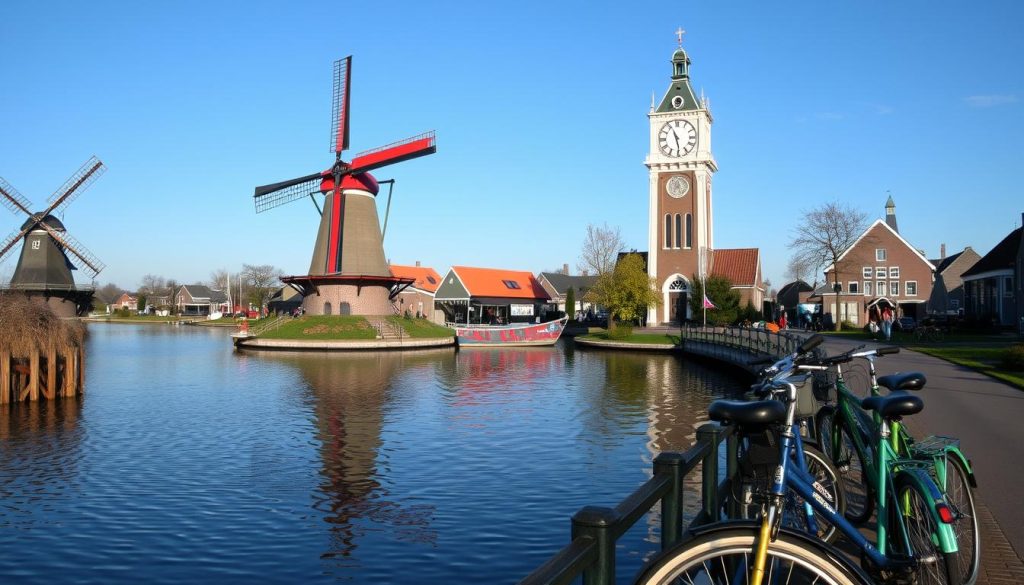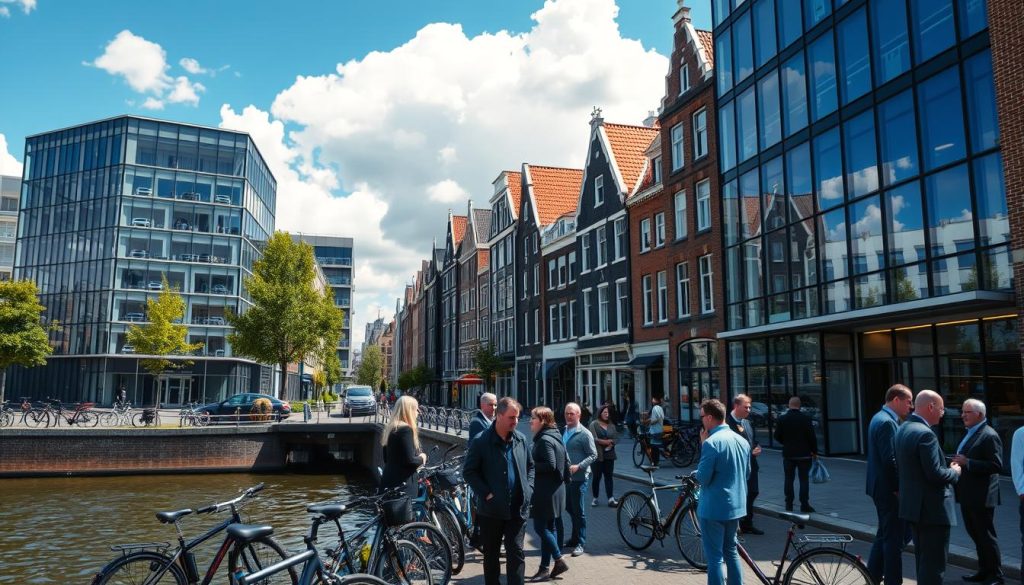For UK professionals, grasping the business culture in the Netherlands is key. It’s vital for building strong business ties. Knowing Dutch business etiquette and how to engage across cultures is crucial.
Understanding cultural dimensions, as The Hofstede Insights explain, is essential. Also, learning the formalities from resources like “Dutch Business Culture” by Expatica helps. These insights prepare you for effective interactions in the Netherlands.
Understanding the Importance of Business Etiquette

In the Netherlands, knowing how to act in business is key. Following the rules of business etiquette makes a big difference. It helps people look good in their work and makes talking to others easier.
Starting with greetings is important. A strong handshake and looking someone in the eye shows you respect and confidence. It’s all about the little things that matter in professional manners Dutch.
Gifts are nice but not always needed. If you do give one, choose something that shows you care about the culture or local skills. It’s best to keep things simple to avoid any awkwardness.
When it comes to clothes, a smart casual look is usually best. Looking neat and tidy shows you respect the workplace. It’s about fitting in without being too formal.
It’s also important to know when to be personal and when to be professional. The Dutch like to be straight and honest at work. But, being friendly can help you network better in the Netherlands.
The Role of Direct Communication in Dutch Business Culture

In the Netherlands, direct communication is key. It’s all about being clear and open. This makes business talks straightforward, helping everyone understand each other better.
This way of talking leads to quick and smart decisions. People value honest opinions and see them as a chance to grow. Open discussions are encouraged, making teamwork easier.
- Emphasis on straightforwardness
- Valuing clarity in business transactions
- Encouragement of open feedback channels
- Avoidance of indirect language or euphemisms
Knowing about Dutch communication is important. It helps build strong business relationships. It also creates a respectful and efficient work environment.
Business Culture in Netherlands: Key Characteristics

The business scene in the Netherlands is unique. It’s known for its egalitarianism, which means everyone is treated equally. This creates a team spirit and respect among colleagues.
Openness is key in Dutch business. People share their thoughts freely, making feedback a normal part of work. This openness helps teams work better together and projects move forward.
Getting everyone to agree is important in Dutch work culture. Decisions are made by talking things through. This way, everyone’s view is heard, leading to better decisions and more team commitment.
- Informality in interactions enhances the relaxed atmosphere of the workplace.
- Trust and reliability are essential components, leading to long-term business relationships.
- Work-life balance is prioritised, reflecting the Dutch commitment to personal time and well-being.
These traits make the Netherlands a great place for businesses. The mix of equality, openness, and consensus makes Dutch business culture stand out. It’s a model for others to follow.
Importance of Punctuality and Time Management

In the Netherlands, being on time is key in work life. It’s not just a nice thing to do; it shows you value others’ time. This is crucial for building trust and respect in business.
Good time management is vital for success in the Netherlands. Companies focus on efficient meetings. They start on time and have clear plans, making sure everyone’s time is used well.
- Punctuality is seen as a sign of respect.
- Time management strategies enhance workflow efficiency.
- Meetings are often structured to optimise productivity.
Knowing how important being on time is in the Netherlands can really help your career. By managing your time well, you can make work better for everyone. This leads to better teamwork and stronger relationships.
Building Strong Business Relationships in the Netherlands

Building strong business ties in the Netherlands is all about trust and reliability. In Dutch culture, networking is key for professionals. It’s where people meet to build lasting connections, not just for business.
Networking Dutch professionals value honesty and straight talk. This shapes how relationships grow over time.
To build strong ties, mix personal connections with professional networks. Showing genuine interest in each other’s success is crucial. Here are some key strategies:
- Go to industry events to meet new partners and clients.
- Join casual meet-ups to build rapport outside formal settings.
- Use social media to stay in touch and share useful info.
Networking is more than just doing business; it’s about ongoing engagement. Trust grows slowly through shared experiences and support. This makes relationships the heart of Dutch business culture.
Hierarchy and Leadership Styles in Dutch Companies

The Dutch business world has a unique hierarchy. It’s known for being flat, which means everyone can talk openly. This setup lets employees help make big decisions. It makes the workplace feel more like a team effort.
In the Netherlands, leaders like to work together. They aim for everyone’s opinion to count. This way, everyone feels included and valued.
- Emphasis on teamwork and shared responsibility.
- Encouragement of open feedback and dialogue.
- Flexibility in managerial roles, adapting to team dynamics.
This approach makes employees feel powerful. It shows they’re important to the team. Knowing how Dutch leaders work helps companies fit in better with local culture.
Negotiation Tactics in Dutch Business Settings

Understanding how to negotiate in the Netherlands is key for business success. The Dutch way combines being assertive with building consensus. This method ensures everyone’s voice is heard and valued.
Preparation is key in Dutch negotiations. People are expected to bring lots of data and insights. Being well-prepared shows respect and promotes transparency. Without good prep, negotiations can stall.
The Dutch like to be direct in their talks. This clear way of speaking helps avoid confusion. UK professionals should learn to be straightforward too. Using facts and logic can make negotiations more effective.
After talking, the Dutch focus on reaching a consensus. They use brainstorming to find common ground. This approach builds strong relationships and leads to better agreements. It’s important to be patient and open in these discussions.
Building strong relationships is also crucial. Trust is a big factor in Dutch negotiations. UK professionals should try to connect with their counterparts personally. This can lead to better deals.
To sum up, success in Dutch negotiations requires clear communication, good prep, and building relationships. By using these strategies, UK professionals can improve their chances of success.
Work-Life Balance: A Cultural Norm in the Netherlands

The Netherlands is known for its focus on work-life balance. This shows how much the Dutch value personal well-being. Studies show that they enjoy spending time with family and doing things they love.
Over 75% of workers want flexible hours to balance their lives better. This is according to CBS Statistics Netherlands. It’s clear that the Dutch want to enjoy their personal time.
Flexible hours and good parental leave are key in the Netherlands. Companies also encourage workers to take breaks. This helps everyone stay focused and happy at work.
- Flexible working hours
- Generous parental leave policies
- Support for part-time work
- Emphasis on family time
More people want to mix work and personal life. This focus on well-being is changing the Dutch work scene. It makes people happier and helps companies do better.
Formal vs. Informal Business Settings

It’s key to know the difference between formal and informal business settings in the Netherlands. In formal settings, things are more structured. Meetings have strict agendas, and everyone is expected to act professionally. You’ll need to wear formal clothes and greet others with respect.
On the other hand, informal settings are more relaxed. Here, you can have open conversations and dress casually. Greetings are friendly, and small talk is common. This is especially true at networking events where making personal connections is important.
- Formal meetings: Expected to be punctual and structured.
- Informal gatherings: Focus on relationship-building and casual interactions.
- Meeting customs: Understanding the context can enhance collaboration.
Adjusting to these differences shows you understand Dutch culture. It helps build stronger relationships and leads to better discussions. Knowing the meeting customs is crucial for success in any setting.
Inclusive Practices and Diversity in the Workplace

In the Dutch business world, inclusivity and diversity are key. Companies in the Netherlands work hard to create a workplace where everyone feels valued. This approach helps staff feel part of the team, boosts creativity, and drives new ideas.
Many policies have been put in place to ensure equal opportunities. These efforts show a strong commitment to inclusivity. They go beyond just following the law, embracing different views and ideas.
- Training programmes that raise awareness about unconscious bias.
- Recruitment strategies aimed at attracting a wider range of candidates.
- Employee resource groups that support underrepresented employees.
By focusing on inclusivity, businesses see better morale and engagement. Companies that value these principles often keep their staff longer and are happier. This focus on equality makes the Netherlands a leader in inclusive business practices.
Adapting to the Dutch Consensus Decision-Making Process

The Dutch way of making decisions is unique. It focuses on teamwork, making sure everyone has a say. This approach helps international workers in the Netherlands do their best.
Teamwork is key in the Dutch style. It means everyone gets to share their thoughts. This helps UK workers fit in better with local ways.
- Open talks bring different views and make everyone feel part of the decision.
- Going for consensus means team members are more committed.
- Good communication helps manage team interactions and keeps debates positive.
Using these methods makes joining Dutch teams easier. It also shows respect for the team spirit in Dutch culture. By following this approach, professionals can enjoy a more welcoming work environment.
The Influence of Dutch History on Present-Day Business Culture

Dutch history has a big impact on today’s business world. The country’s history of trade and commerce has shaped its economic values. The Golden Age of the Netherlands, with its explorations and trade, set the stage for a global business mindset.
The legacy of colonialism and mercantilism has made Dutch business culture open and innovative. Dutch companies value teamwork and working together. This shows the importance of community and mutual benefit in Dutch culture.
Trade history has also made Dutch businesses adaptable and open to learning. They welcome diversity and inclusiveness, reflecting the Netherlands’ cultural values. These historical influences help Dutch businesses stay resilient and adaptable in a changing world.
Tips for Successful Cross-Cultural Engagements with Dutch Professionals
Working with Dutch professionals means understanding their culture. A key tip is to be direct in your communication. This is because the Dutch value clear and straightforward talk in business.
Being clear helps build trust and shows respect. It’s important to avoid being vague. This way, you show you value their time and thoughts.
Equality and inclusiveness are also key. Dutch workplaces value everyone’s opinion, no matter their position. By encouraging all to speak up, you improve teamwork.
Using these strategies helps build strong relationships. It also leads to better results in team projects.
It’s also important to respect the Dutch work-life balance. Showing you care about their personal time makes them happier at work. By doing this, you can work well with Dutch colleagues and achieve great things together.

